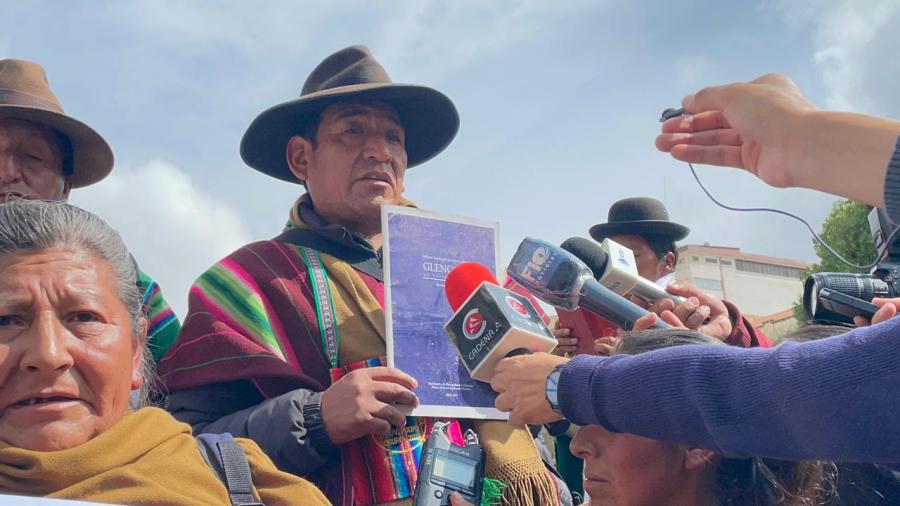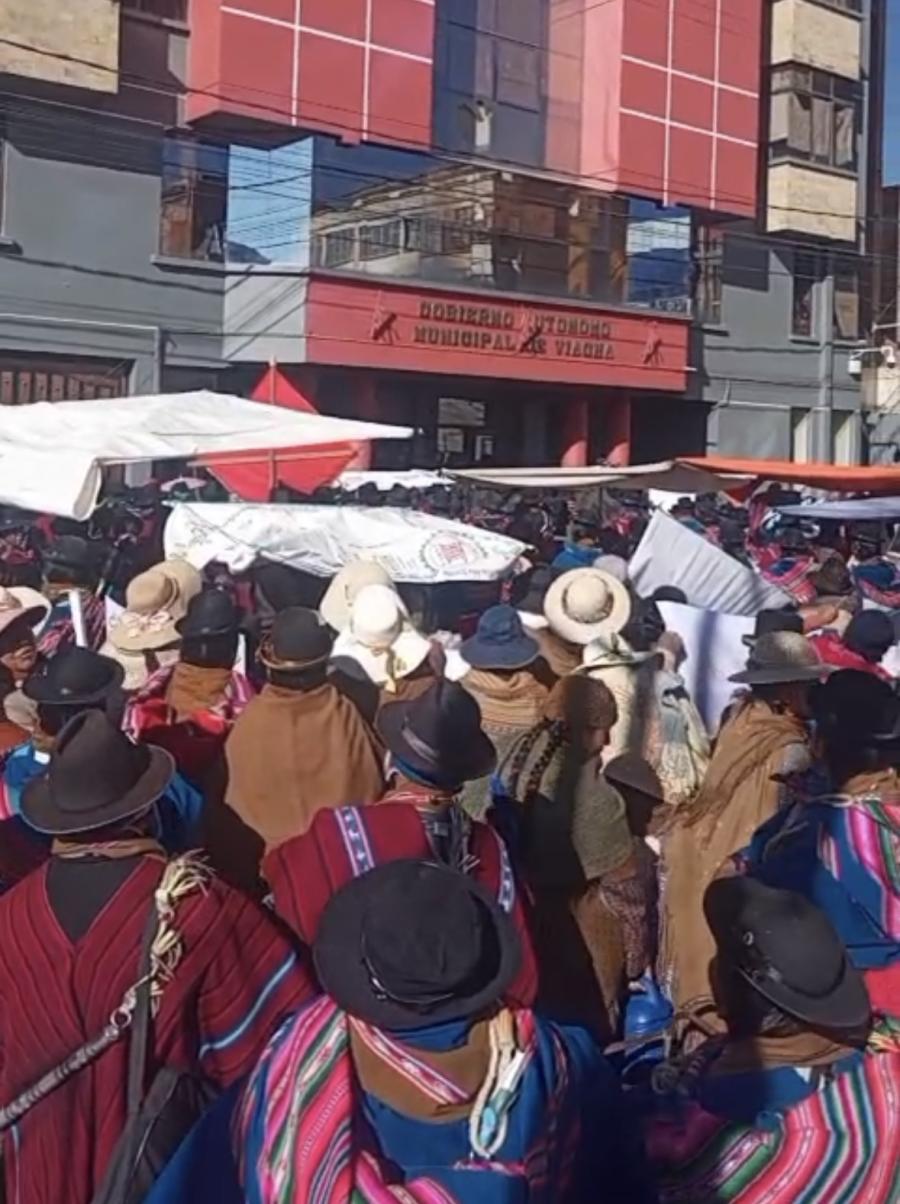The issue of indigenous peoples is one of the most timely national and international concerns. We use the terms indigenous and campesino (or peasant) indiscriminately in Bolivia and Latin America, as the majority of the poor are indigenous peasants.
Indigenous People and the Nation-States of Latin America
The last 15 years have produced significant changes in the relations between indigenous peoples and the nations of Latin America. Indigenous peoples have gained strength and now constitute an emerging social sector and political force within our country's majority Every day their territorial and demographic presence grows. Their languages are gaining strength through public and educational use. The communities and peoples have developed a consciousness of their cultural differences. They have proposed a series of demands impelled by a vast network of ethnically-based organizations from the local level to national confederations. Also, the econ-omies of indigenous peoples have articulated themselves in diverse ways within the national market and some are making successful progress into international commerce.
This emergence of indigenous peoples has put the discussion of various important items for the future of nations on the international agenda: land as an economic base, a space of social reproduction, and a condition for survival; specific collective rights that are culturally distinct; access to social justice; the right to local self-rule; the right to our own form of development and participation in national development; and the right to participate in democracy with our own institutions and dynamics as distinct peoples.
Together with the strengthening of indigenous communities in most Latin American countries and as part of the process of modernization, important constitutional, legal, and institutional reforms have occurred which affect or modify the traditional relationships with indigenous peoples. The most recent constitutional reforms tend to recognize (in Bolivia, Ecuador, Mexico, and Paraguay) the multi-cultural character of these states and the existence of indigenous peoples within their borders as singular entities with distinct cultural and linguistic attributes and specific rights. Some reforms strengthen the organization of indigenous communities (in Bolivia, Guatemala, and Colombia), creating bodies for public rule empowered to exercise certain levels of authority and self-governance in their territories. Various constitutions were modified to strengthen the structure of land tenure, associating it with the preservation and adequate maintenance of the environment, and increasing indigenous peoples' access to key natural resources such as forests and water resources. In the majority of Latin American countries, indigenous languages are achieving recognition and constitutional protection, and bilingual and intercultural education is being promoted. New legislation on agrarian issues, education, popular participation, municipal regulations, and economic development are emerging to make the already-established constitutional propositions more concrete.
Finally, in various countries the government agencies regulating the relations between the government and the indigenous communities are being modified. In some countries, such as Bolivia, Ecuador, and Peru, these institutions have taken a Ministerial or Secretarial position; in others like Guatemala or Chile, it is a case of corporations or special funds attending to the necessities of development. Others, like Mexico, have developed public law offices or procuradorias to protect indigenous rights. It is clear that the old indigenist tradition characterized by integrationism and paternalism is giving way to new policies based on participation, the coordination of interests, and the creation of new forms of development specifically aimed at indigenous communities, but consistent with national objectives.
International Developments
A new international normative system is being developed which aims to establish a statute of, indigenous rights similar to those developed by the ILO's Convention 169, the Constitutive Agreement of the Indigenous Fund, the United Nations, and the Organization of American States (OAS). Some of the specialized international organizations (the multilateral banks and the Inter-American Development Bank, UNESCO, UNICEF, the Interamerican Indigenous Institute, and the Interamerican Commission on Human Rights) are incorporating new principles and operating guidelines based on the right of participation, the obligation to have prior consultation with affected groups, the protection of cultural rights, etc.
Recent Developments of the Indigenous and Peasant Movement in Bolivia
Our country has had a political history excluding peasants and indigenous peoples. National democracy did not include any representation at the national level. In the 1970s, this exclusion was publicly questioned by an independent peasant movement, which in June 1979, formed the Confederación Sindical Unica de Trabajadores Campesinos de Bolivia (CSUTCB or the Union of Peasant Workers of Bolivia), composed mainly of Aymara and Quechua peasants of the altiplano [the high plateau area], the yungas [the Andean foothills] and valleys. This organization led the struggle against the anti-democratic Military Peasant Pact (Pacto Militar Campesino), contributed to the recuperation of democratic freedoms, put the brake on state interference in union affairs, and began the search for a form of political participation that had its own character. It was part of the Central Obrera Boliviana (COB or the Bolivian Workers Central), although it maintained its own independence.
In its initial years, the CSUTCB negotiated and made agreements with the governments in power. In some cases it achieved success. It always stood out as a constant source of ideas and suggestions on issues such as the Ley Agraria Fundamental (the Basic Agrarian Law), the Corporaciones Agropecuarias Campesinas (CORACA, the Peasant Agricultural Cooperatives), intercultural and bilingual education, the reform of the Political Constitution, and the permanent recovery of national symbols.
This movement lost strength in the late 1980s when leadership from the Marxist left came to power. They did not want to negotiate or make agreements with the state and predicted the complete defeat of neoliberalism. This antagonistic attitude led to CSUTCB's absence from the debate over important national issues such as the redrafting of the Political Constitution, and the laws of the Educational Reform, Popular Participation, Forestry, Administrative Decentralization, the Mining Code, and many others.
In contrast, the trajectory of the Confederación Indígena del Oriente Boliviano (CIDOB, Indigenous Confederation of the Bolivian Oriente) is more recent but has a more clearly defined character. It joins together the indigenous minorities of the llanos [the plains] and the Bolivian Amazon. Numerically, it represents no more than 200,000 people, compared to the millions of Quechua and Aymara. It came to prominence with the March for Territory and Dignity in the middle of 1990. This organization was not created in order to contest the state, but has a pragmatic attitude and has negotiated on various issues such as the ratification of Convention 169 of the ILO, the pausa ecológica [a decree that halted certain development actions pending the study of their broad environmental impact], and the creation of an indigenous forest guard.
The First Indigenous Reforms in Bolivia
Over the past four years, the Bolivian government has implemented legal measures to recognize indigenous rights while taking into account the intersecting interests of ethnicity In August, 1994, Bolivia recognized itself as a multiethnic and pluricultural country after 169 years of life as a republic. This measure shows the will to establish policies regarding the recognition of cultural diversity and eliminating integrationist policies. Currently, work is underway to ensure that legislation and all social and economic life comply with this generic principle. The social, economic and cultural rights of indigenous peoples are recognized as being equal to all other Bolivian citizens:
- Indigenous peoples in Bolivia were incorporated into the category of agricultural workers with respect to the application of the General Occupational Law.
- The Bolivian population over the age of 65, including indigenous peoples, will receive an annual retirement bonus of $248 for the rest of their lives as a return on investments in state enterprises.
- Traditionally occupied indigenous territories are recognized, respected, and protected.
- The sustainable development of natural resources located on their land is guaranteed.
- Through the law of the national service of agrarian reform, these communal lands are now protected by the constitutional demands of the indigenous peoples and by the ILO's 169 Convention.
- The Forestry Law grants indigenous peoples the exclusive right to forest resources on their lands.
- The state is also promoting intercultural and bilingual education and the formation of the Interethnic Educational Councils has begun.
- Some textiles and archeological artifacts which were exported from Bolivia have been returned.
- The legal status of indigenous and peasant communities is recognized enabling the collective titling of their lands.
- The Constitution empowers traditional indigenous and peasant authorities to exercise administrative functions over public or private affairs.
- Indigenous peoples can also apply their own norms as an alternative way to resolve conflicts.
A recent project of the penal code includes the use of oralidad del juicio [the public reading of judicial decisions] using indigenous languages, establishes mixed tribunals integrated by technical judges and jurors, and incorporates the possibility of the conciliation of the parties in order to extinguish the penal proceedings.
In the past few years indigenous peoples and peasants have begun to participate in the spheres of state power, including: the Vice President of the Republic, the Secretary for Ethnic Affairs, the Sub-Secretary for Rural Development, and the Presidency of the Fund for Peasant Development. Mburubicha Guasu, a Guaraní leader or Capitán Grande, has been named Departmental Counselor for Santa Cruz. Of the 311 municipalities, 35% have indigenous or peasant councilmen and mayors. A group of indigenous and peasant politicians have organized themselves in the national parliament in order to assert their identity The formation of Indigenous Municipal Districts whose boundaries coincide with the jurisdiction of ayllus [kin-based communities] and local forms of government has begun. These past four years the Vice President of the Republic has maintained bimonthly meetings with the National Commission of CIDOB in order to analyze, solve, and match opinions on various national and regional issues.
Bolivia's Contribution to the International Indigenous Agenda
The actions carried out at the national and international levels are aimed at recognizing the fundamental rights of indigenous peoples and of their direct participation in international forums. The Bolivian government has been committed to this task and has taken several steps:
- Convened the Latin American and Caribbean Regional Preparatory Meeting for the International Decade of Indigenous Peoples [in Cochabamba, May 1994];
- Established the National Committee for the International Decade of Indigenous People [August 1995], comprised of indigenous peoples, peasants and the government;
- Accredited an indigenous person as a representative to the working group of the United National Human Rights Commission that is examining the drafting of an International Declaration on the Rights of Indigenous Peoples;
- Carried out a national consultation on the draft of the Organization of American States' Interamerican Declaration on the Rights of Indigenous People in conjunction with CSUTCB and CIDOB;
- Fully supported the proposal to establish and fund the Development Fund for the Indigenous People of Latin America and the Caribbean;
- Supports and promotes the creation of a UNESCO professorship on indigenous affairs at the Universidad Andina Simón Bolivar;
- Organized the II Congress of Intercultural and Bilingual Education in Latin America and the Caribbean (Santa Cruz, November 1996);
- Organized the International Seminar on the Defender of Peoples and the Indigenous Question (Santa Cruz, May 1995).
Conclusion
As our grandfathers said -- and I also heard this in China -- a journey of a thousand kilometers begins with the first step. Bolivia has taken the first step. Looking back, we can see great progress, looking forward we can see that much is still lacking. Still pending is the elimination of poverty affecting indigenous peoples and peasants. We must move ahead with focused and prioritized work in order to eliminate it.
We are confident that within the transformed democratic system we can succeed. Because of this transformation, we warn that in the future it will be difficult and perhaps impossible to exclude indigenous peoples from the construction of a multiethnic democracy We have summarized our contributions knowing that we all must join forces in order to construct the history of the next 500 years.
Article copyright Cultural Survival, Inc.


